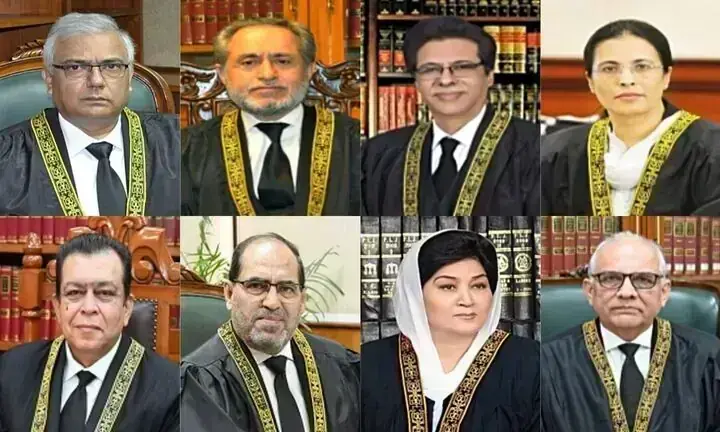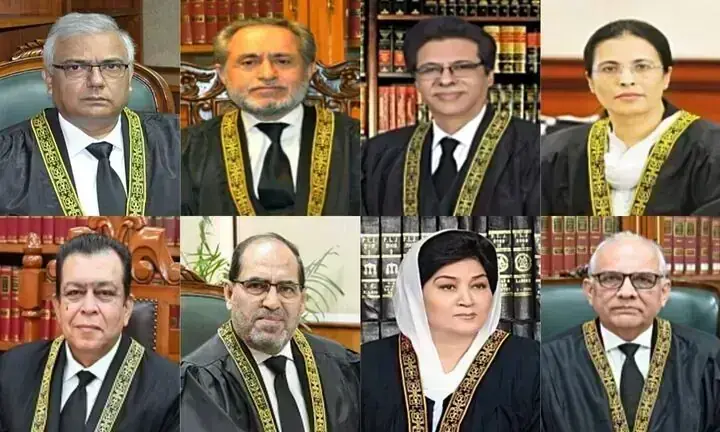
Justice Ayesha Malik wondered on Wednesday whether Article 191A of the Constitution meant that a full court could no longer be formed as the Supreme Court’s (SC) Constitutional Bench (CB) heard petitions against the 26th Amendment.
Article 191A was an addition to the Constitution made under the 26th Amendment to form constitutional benches in the Supreme Court to specifically deal with cases pertaining to constitutional matters, with its judges nominated by the Judicial Commission of Pakistan (JCP).
The Amendment was passed by Parliament during an overnight session in October last year, with the PTI claiming seven of its lawmakers were abducted to gain their favour as the party opposed the legislation. The Balochistan National Party-Mengal (BNP-M) also alleged its two senators were being pressured, with both later defying party line to vote in the tweaks’ favour.
The legislation, which altered judicial authority and tenure, has been a lightning rod for debate, with both opposition parties and legal experts questioning its impact on the judiciary’s independence.
The tweaks took away the SC’s suo motu powers, set the chief justice of Pakistan’s (CJP) term at three years and empowered a Special Parliamentary Committee for the appointment of the CJP from among the three most senior SC judges. It also paved the way for the formation of the CB, which is now hearing petitions against the very legislation that enabled its establishment.
The bench hearing the pleas is headed by Justice Aminuddin Khan and also includes Justices Mazhar, Jamal Khan Mandokhail, Ayesha Malik, Syed Hasan Azhar Rizvi, Musarrat Hilali, Naeem Akhtar Afghan and Shahid Bilal Hassan.
Senior lawyer Abid Shahid Zuberi, also a former Supreme Court Bar Association (SCBA) president, continued his arguments for the fourth consecutive hearing today. The hearing was adjourned till October 20 (Monday).
Thus far, Zuberi, Lahore High Court Bar Association (LHCBA) lawyer Hamid Khan, Balochistan High Court Bar Association (BHCBA)’s counsel Munir A. Malik, and petitioner Barrister Salahuddin Ahmed have presented their arguments.
They have sought the formation of a 16-member full court as per the number of judges present in the SC in Oct 2024, when the Amendment was passed. Judges have questioned whether the CB has the power to issue orders for the constitution of a full court, as requested by petitioners.
Today’s hearing
At the outset of the hearing, petitioner Advocate Akram Sheikh brought up the matter of a “good judicial environment”.
At this, Justice Mandokhail, referring to his exchange with Justice Ayesha yesterday, said: “What happened yesterday should not have happened.”
Sheikh also urged the bench to fix a duration for lawyers to present their arguments, at which Justice Aminuddin noted that time restrictions applied to everyone.
Assuring the bench that he would conclude his arguments today, Zuberi said he would cite past court orders that define the difference between a bench and a full court.
Justice Hilali then asked whether judges will have to stop calling a full court a bench, to which Zuberi replied in the affirmative. Citing several rulings, the lawyer said constituting benches was the Practice and Procedure Committee’s power.
Zuberi reiterated that he was requesting a full court, adding, “You can [only] form a bench.”
Justice Mazhar noted that the verdicts cited by Zuberi were from before the 26th Amendment was passed, when Article 191, under which the CB was formed, was not present.
Justice Mazhar said, “The Constitutional Bench can hear the case of the 26th Amendment. If needed, all judges of the Constitutional Bench can be included.
“But you are saying that so and so judges should be part of it, and not the others, so this is strange,” he added.
Zuberi then replied that there were no restrictions on the CB forwarding the matter to the CJP. Justice Aminuddin remarked, “It is one thing to refer a matter to the chief justice, and another to pass a judicial order.”
Zuberi was then told to read out Sections 3 and 5 of the Constitution’s Article 191A. Justice Ayesha asked, “Does any rule prevent this bench from issuing a judicial order to form a full court? What is stopping us from ordering the Judicial Commission to nominate all judges as a judge of the Constitutional Bench?
“Are we saying that the Judicial Commission ranks above the Supreme Court?” she asked.
At one point during the hearing, Justice Ayesha remarked, “Does Article 191A mean that a full court can never convene now? Can decisions of a larger bench no longer be overturned?”
More to follow

